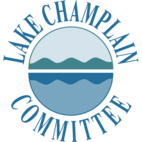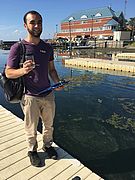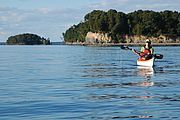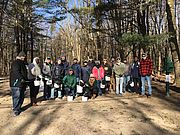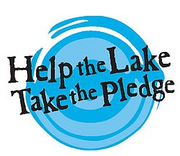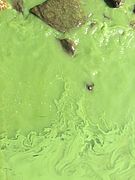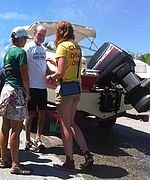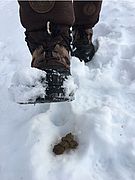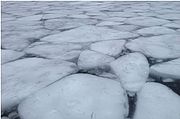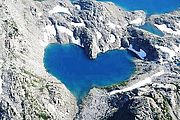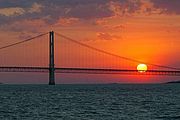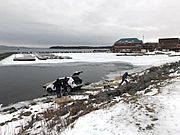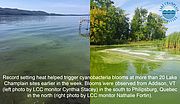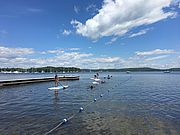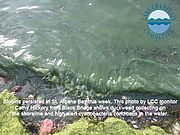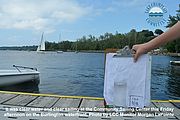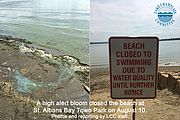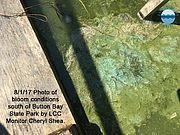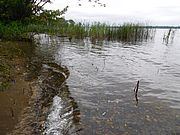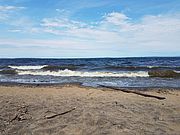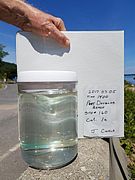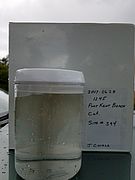We're gearing up for the summer monitoring season and are looking for people to report on water quality. LCC cyanobacteria monitors receive training to assess water conditions, visit the same site throughout the season and file a weekly online report from mid-June through the end of September.
Read...News from Selected Category
We're looking for accomplished paddlers to help check remote Trail locations and areas without on-site managers.
Read...LCC's volunteers are a diverse group of dedicated people but they all have at least one thing in common: a love for Lake Champlain and a passion to protect it.
Read...Know someone who loves the lake? Have a good friend who you play on the water with?
Read...Protecting Lake Champlain's health is the shared responsibility of all of us who live in or visit the watershed.
Read...Vermont business, municipal, and environmental leaders came together in January to express shared support for long-term clean water funding via a parcel fee, and the establishment of a Clean Water Authority to collect and distribute those funds to on-the-ground clean water projects throughout the state. Groups endorsing the measure included the Lake Champlain Committee (LCC), Vermont Conservation Voters, Vermont Natural Resources Council, Lake Champlain Regional Chamber of Commerce, Pomerleau Real Estate, and the Vermont League of Cities and Towns.
Read...In late December 2017, New York Governor Andrew Cuomo announced a $65 million four-point initiative to aggressively combat harmful algal blooms (HABs) in Upstate New York waters. Twelve lakes that are vulnerable to HABs and are critical drinking water sources and vital tourism drivers were chosen as priority waterbodies. Lake Champlain and Lake George are two of the twelve that will receive greater focus. Lessons learned will be applied to other impacted waterbodies moving forward. Read...
Looking for an outdoor summer job near the water? Enjoy talking to people about the lake? If yes, consider becoming a Lake Champlain boat launch steward. The Lake Champlain Basin Program (LCBP) is hiring up to twelve boat launch stewards to work at New York and Vermont public boat launch access areas during the steward program’s 12th season. The stewards help to reduce the spread of aquatic invasive species by identifying high-risk boats for courtesy inspection and providing information about invasive species spread prevention. Read...
Winter weather doesn’t stop dogs from having to head outside to fulfill their “dooty” and it shouldn’t stop dog owners from cleaning up after their canine friends either. Unfortunately, even diligent pet owners may get a little lax about scooping poop when the mercury drops and sidewalks and walking trails become snow covered or icy. Excuses range from “it’s too cold or hard to pick up poop with gloves on” to “it doesn’t matter in winter”. It may seem harmless to leave hound mounds behind on your winter walks to melt away when temperatures rise. However, that pet waste doesn’t just disappear, it’s flushed off into our waterways with snowmelt and spring rains. Read...
This past January, confused vacationers unknowingly drove their car onto the frozen waters of Lake Champlain by the Burlington Coast Guard Station. The vehicle quickly broke through and sank in the inner harbor. Fortunately, all of the passengers were able to escape unharmed and the car was ultimately moved to shore. While the group didn’t intend to drive onto the lake, their tale is a reminder to leave cars and trucks in the parking lot and always be cautious about venturing onto ice. Natural ice is a beautiful and intriguing phenomenon but it’s critical to be prepared before exploring it. The fluctuating temperatures of recent weeks urge caution. Widely varying temperatures that cause ice to thaw and then refreeze triggers honeycombed ice that is weak and unsafe. Follow the link to learn about some safety tips based on guidance from the Michigan Department of Natural Resources. Read...
During this month of Valentines we thought you’d enjoy a look at lakes in the universal symbol of love. From Canada’s Heart Lake to India’s Eros Lake they’re beautiful to behold. Click here to see lake love across the globe.
President Trump's 2019 budget would again remove all EPA funding of cleanup programs for Lake Champlain, the Great Lakes, Chesapeake Bay, the Gulf of Mexico, Long Island Sound, San Francisco Bay, Puget Sound and South Florida, including the Everglades and Keys. Again, it's a short-sighted draconian move that will degrade freshwater resources and threaten public health and our economy. Read more here.
“It appears the Vermont legislature will join Gov. Phil Scott in delaying again any decision on how to raise millions in new revenue to pay for Vermont's billion-dollar cleanup of its waterways. Environmental advocates and federal regulators are looking on with increasing concern."
Read...Vermont officials' refusal to share their stormwater document leaves unanswered questions about how the state is — or isn’t — working toward its commitments on water quality. Read more in this Seven Days article that outlines the Lake Champlain Committee and VNRC’s request for answers. Read...
"It sounds like a scene from a movie -- friends from Connecticut on a ski vacation in Vermont get lost, turn on their GPS, and next thing you know they are driving on a lake as the car is sinking. Well, that's exactly what happened” Read...
From September 24 through mid-week, a record-setting heat wave helped spawn or perpetuate blooms at over 20 monitoring sites along the Lake Champlain shoreline. The wet spring and summer had already flushed lots of nutrients into our waterways priming conditions for cyanobacteria to take off during the spate of hot, still weather.
Read...Mixed conditions were reported by Lake Champlain Committee (LCC) monitors again this week on Lake Champlain and inland lakes. Cyanobacteria blooms persisted in St. Albans Bay and Lake Carmi and in parts of Missisquoi Bay. Low alert conditions were observed at some Main Lake North and Main Lake Central sites and at Shelburne Pond.
Read...Mixed conditions were reported by Lake Champlain Committee (LCC) monitors yet again on Lake Champlain and inland lakes. Cyanobacteria blooms persisted in St. Albans Bay and parts of Missisquoi Bay and Main Lake North along with Lake Carmi. Low alert conditions were reported at Lake Memphremagog and Lake Morey.
Read...Monitors reported mixed conditions again this past week on Lake Champlain and inland lakes. Summer is on the wane and many state and municipal beaches are closed or will be closing soon, however LCC will continue to send weekly reports through the end of the month. Please be cautious while recreating on the water as blooms may persist through the reporting season.
Read...As we head into the Labor Day weekend LCC monitors are reporting both clear water and cyanobacteria blooms. While there are many beaches open and safe for swimming, we have received reports of blooms in Bulwagga Bay, Maquam Shore, St. Albans Bay, Missisquoi Bay, Lake Carmi, Shelburne Pond and Ticklenaked Pond.
Read...Lake Champlain Committee (LCC) cyanobacteria monitors mainly reported good conditions this week. The exceptions so far are low alerts from Monday August 21 at Philipsburg Quebec. The Quebec reports were from research sites that are monitored every two weeks so conditions may change well before the tracker gets updated with the next report. The other low alert came from Ticklenaked Pond in Ryegate in Vermont's Northeast Kingdom. There was also a report of an unusual cyanobacteria on Lake Morey in Fairlee, Vermont. Scroll down to see a picture of Rivularia spp. and learn more.
Read...While blooms witnessed on Lake Champlain were restricted to Missisquoi Bay (one location) and St. Albans Bay (four sites), we are still at the peak bloom period for our region. Spring and summer rains have flushed lots of nutrients into the water and temperatures are predicted to rise through the beginning of next week.
Read...This week there were mixed conditions reported on Lake Champlain but only one report of a bloom at Vermont inland lakes (low alert at Ticklenaked Pond) that participate in the monitoring program. While blooms witnessed on Lake Champlain were restricted to Missisquoi Bay (one location), St. Albans Bay (four sites), Inland Sea (two sites) and the northern part of the lake (one location), we are in the middle of what is generally the peak bloom period for our region.
Read...cyanobacteria monitors filed a record 171 reports this week from Lake Champlain and inland lake locations. Most sections of Lake Champlain experienced mixed conditions with both low and high alert blooms for at least some sites. The exceptions were Malletts Bay and the South Lake which reported generally good conditions at all sites but had fewer reports overall. Conditions can change rapidly and blooms can show up anywhere on the lake. Please be watchful, report anything of concern and avoid cyanobacteria.
Read...There was one report of low alert conditions in South Alburgh but that was short-lived and the water was clear the next morning. All other monitors reporting this week noted good conditions on Lake Champlain and other waterways in the program!
Read...We had a great response from Lake Champlain Committee (LCC) cyanobacteria monitors this week with 135 reports for Lake Champlain and inland lake locations! While it's been a week with lots of lovely summer weather, all the sunshine is encouraging cyanobacteria activity. Alert conditions were reported at Lake Champlain sites at Pt. Au Roche State Park beach and Black Bridge in St. Albans Bay as well as at Lake Carmi, Lake Amherst and Ticklenaked Pond.
Read...Monitors generally reported good conditions during another wet week. While Deep Bay at New York's Pt Au Roche State Park had a low alert bloom on 7/10, it had cleared by the next day. (Pt Au Roche had a short-lived bloom around the same time last year.) As of late Friday afternoon (7/14/17) there were no blooms at any of the Lake Champlain monitoring sites that reported this week.
Read...We had reports from 122 different Lake Champlain Committee cyanobacteria monitoring sites this week as of late afternoon on Friday. There were no reports of blooms on Lake Champlain, Lake Iroquois, Lake Memphremagog, and several other VT lakes but unfortunately the bloom at Shelburne Pond's boat launch persists at low alert levels.
Read...We had reports from 105 different sites this week as of mid-afternoon today. There were no reports of cyanobacteria blooms from monitoring sites on Lake Champlain, Lake Carmi, Lake Iroquois, Lake Memphremagog, and several other VT lakes but unfortunately Shelburne Pond experienced a high alert bloom at the boat launch.
Read...We had reports from 54 different sites this week. We will see an increase in the number of site reports as the season progresses and more of our monitors get out on the water. There were no reports of cyanobacteria blooms from monitoring sites on Lake Champlain, Lake Iroquois, Lake Memphremagog, and several other VT lakes.
Read...